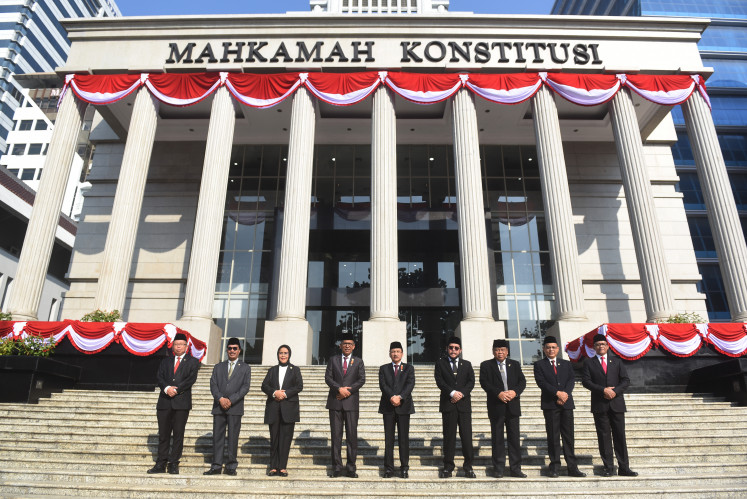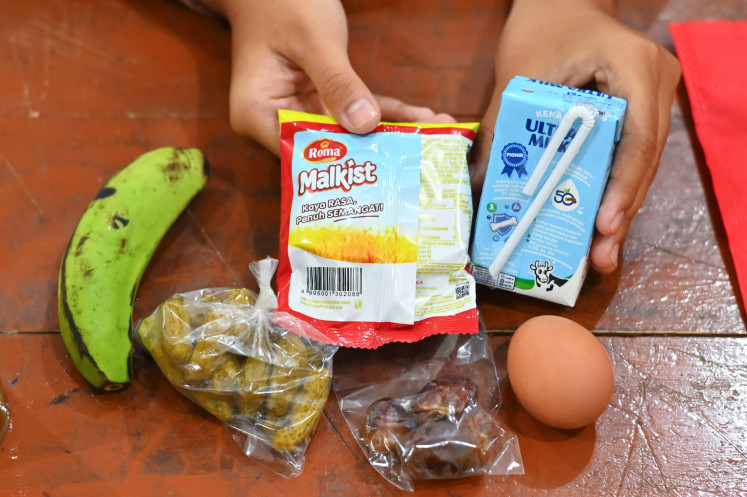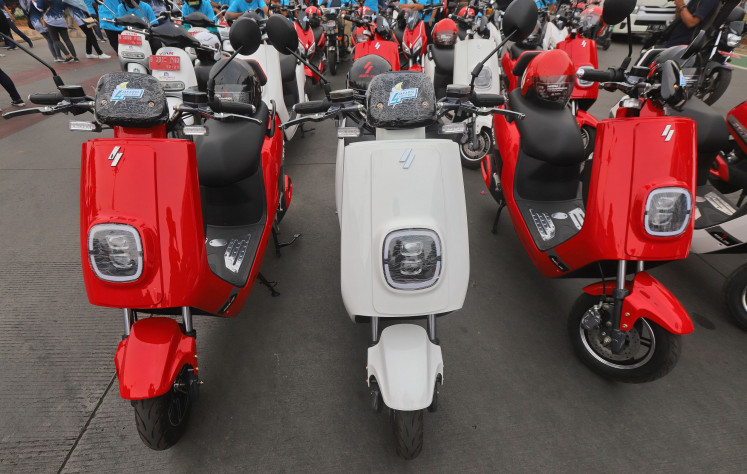Indonesia's sea nomads turn to jobs on land
The Bajau tribe of fishermen led a nomadic life at sea for generations, spending days and nights on boats with thatched roofs in the waters between Indonesia, Malaysia and the Philippines. But for the hundreds of Bajau people living on the tiny boardwalk island village of Papan Island in Central Sulawesi, their ancestors' unique way of life has all but died out.
Change text size
Gift Premium Articles
to Anyone
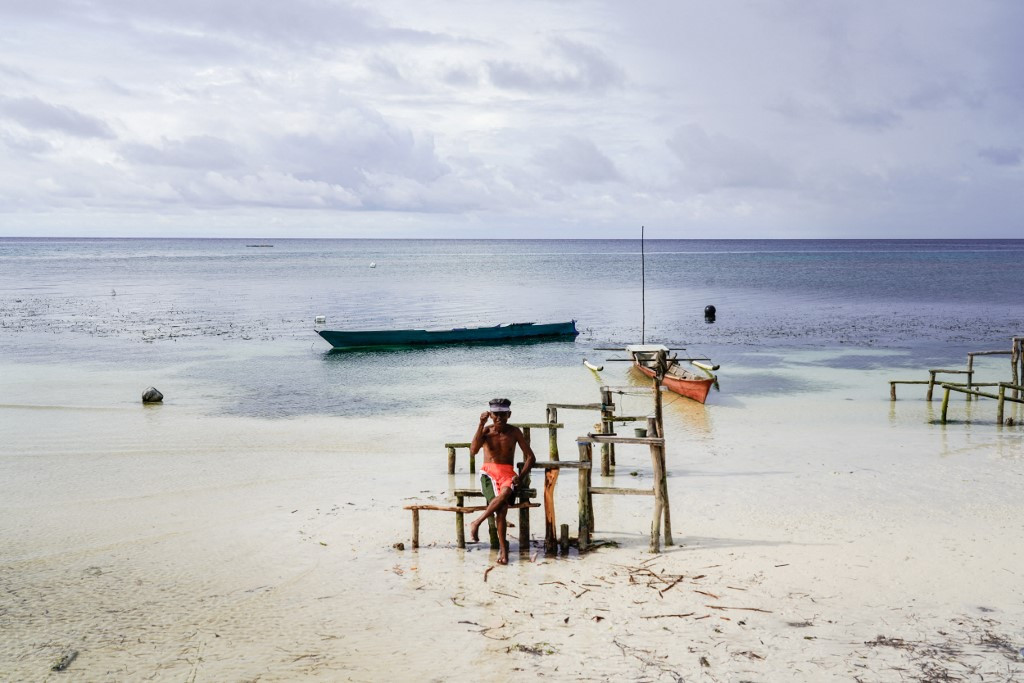 A man sits on a boat rack on a beach in Kadoda, nearby the Bajau village of Papan Island in Central Sulawesi on July 3, 2024. The Bajau tribe spread across Indonesia, the Philippines and Malaysia have spent centuries at sea, known for its members' lung-busting diving skills that allow them to fish underwater with their bare hands or spears for longer periods than other humans. But in Papan Island, a waterworld-like village in Central Sulawesi, residents say they have turned to new income streams as fish stocks fall, government pressure forces them to land and technology shifts their habits. (AFP/Jack Moore)
A man sits on a boat rack on a beach in Kadoda, nearby the Bajau village of Papan Island in Central Sulawesi on July 3, 2024. The Bajau tribe spread across Indonesia, the Philippines and Malaysia have spent centuries at sea, known for its members' lung-busting diving skills that allow them to fish underwater with their bare hands or spears for longer periods than other humans. But in Papan Island, a waterworld-like village in Central Sulawesi, residents say they have turned to new income streams as fish stocks fall, government pressure forces them to land and technology shifts their habits. (AFP/Jack Moore)
S
ofyan Sabi's sea-dwelling community has fished beneath the waves off the Indonesian coast for centuries, but climate change and overfishing have forced him and many of his contemporaries on land to make a living.
The Bajau tribe of fishermen led a nomadic life at sea for generations, spending days and nights on boats with thatched roofs in the waters between Indonesia, Malaysia and the Philippines.
Members of the tribe learn to dive from a young age, and their bodies have adapted over time to allow them to fish underwater for longer periods, researchers say.
But for the hundreds of Bajau people living on the tiny boardwalk island village of Papan Island in Central Sulawesi, their ancestors' unique way of life has all but died out.
"We changed professions. We are fishermen who work at a farm. Farming gives better income because there are many crops I can plant," Sofyan said, adding that he owns a nearby two-hectare plot to grow corn and bananas.
"Sometimes we earn nothing by going to sea. Sometimes there are fish, sometimes there aren't any," the 39-year-old told AFP.
Trained to hold his breath between 10 and 15 meters deep since he was a child, Sofyan still scans the waters for sea cucumbers or an octopus that could earn him as much as Rp 500,000 (US$31).
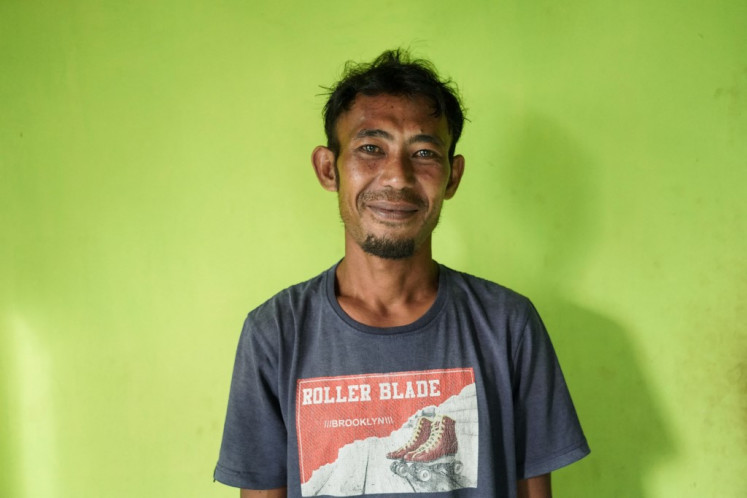
Researchers attribute the Bajau ability to dive deeper and longer to a possible genetic mutation that has given them larger spleens, allowing their blood to store more oxygen.
But commercial overfishing and rising temperatures have made sea catches increasingly unpredictable, said Wengki Ariando, a researcher at Thailand's Chulalongkorn University who has studied the Bajau.
"They are facing decreasing marine resources," he said.
As temperatures rise, fish migration and mating patterns change, corals are bleached, and the food chain changes.
Read also: Protecting 30 percent of oceans a huge challenge for the planet
More than half of Indonesia's 11 fishery management areas are now listed as fully exploited.
The country's fish stocks fell from 12.5 million metric tonnes in 2017 to 12 million in 2022, fishery ministry data shows.
"The fish are decreasing because too many people are catching them," said 52-year-old fisherman Arfin.
'Changed their livelihood'
A dilapidated mile-long jetty takes visitors along turquoise waters onto Papan Island.
Davlin Ambotang, who lives on the island, says the Bajau first started to settle there three generations ago.
"They saw this island as suitable for building houses, so they settled there. No longer nomads, moving around," he said.
Read also: Climate refugee threat looms over islanders as crisis worsens
But life on land has its own challenges.
Davlin's brother runs a homestay banking on tourist visits.
He complains that authorities direct visitors to sleep at government-built cottages instead of helping Bajau businesses flourish.
"There's no additional income for the people. The government controls everything," said Sofyan. "There are many arguments between them and the locals."
The long stateless Bajau grew increasingly settled in villages like Pulau Papan in search of government recognition.
"The Bajau changed their livelihood because to get accepted as a people in Indonesia they have to be settled," said Wengki, adding that the drive to register them officially began in the 1990s under former president Soeharto.
'Difficulties on land'
Wooden boats sit at the edge of the island, while a main walkway cuts through it, splintering off into side jetties.
The village hosts a silver-domed mosque.
On a makeshift court, women play a game of volleyball, while a group of men sit around smoking cigarettes.
"The young generation, they look like they are missing their identity," said Wengki. "They are more like a land-based community."
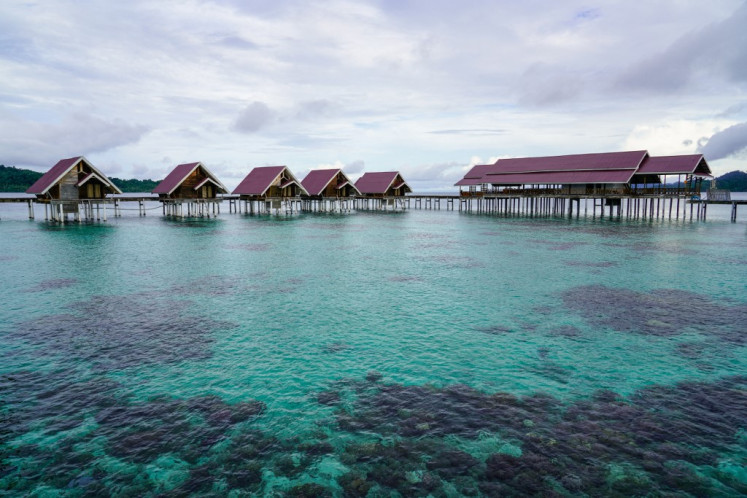
With internet access available on land, the Bajau have set up groups on social media with thousands of followers, helping each other with their problems.
"There is no development, nothing. From the district government, there were donations, each family gets two to three bags of rice every month," said Tirsa Adodoa, a housewife in her 20s whose husband is a fisherman.
"It's not enough if we only rely on catching octopuses. If the octopus price drops like right now [...] it's not even enough for us to eat or buy things."
Read also: Climate change is messing with how we measure time: study
But others yearn for the nomads to keep their seafaring ways; worrying future generations will be less like their boat-dwelling ancestors.
"Once they feel comfortable, it won't be easy for them to go back to the sea," said fisherman Muslimin, 49.
"I wish they could work only as fishermen, because it's fun. There are too many difficulties on the land."





